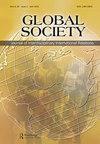Human/Machine(-Learning) Interactions, Human Agency and the International Humanitarian Law Proportionality Standard
IF 2.3
Q2 INTERNATIONAL RELATIONS
引用次数: 0
Abstract
Developments in machine learning prompt questions about algorithmic decision-support systems (DSS) in warfare. This article explores how the use of these technologies impact practices of legal reasoning in military targeting. International Humanitarian Law (IHL) requires assessment of the proportionality of attacks, namely whether the expected incidental harm to civilians and civilian objects is excessive compared to the anticipated military advantage. Situating human agency in this practice of legal reasoning, this article considers whether the interaction between commanders (and the teams that support them) and algorithmic DSS for proportionality assessments alter this practice and displace the exercise of human agency. As DSS that purport to provide recommendations on proportionality generate output in a manner substantively different to proportionality assessments, these systems are not fit for purpose. Moreover, legal reasoning may be shaped by DSS that provide intelligence information due to the limits of reliability, biases and opacity characteristic of machine learning.人/机器(学习)互动、人的能动性和国际人道法比例标准
机器学习的发展引发了关于战争中算法决策支持系统(DSS)的问题。本文探讨了这些技术的使用如何影响军事目标中的法律推理实践。国际人道主义法要求评估攻击的相称性,即与预期的军事优势相比,对平民和民用物体的预期附带伤害是否过大。本文将人类代理置于这种法律推理实践中,考虑指挥官(以及支持他们的团队)与用于比例评估的算法决策支持系统之间的互动是否改变了这种实践并取代了人类代理的行使。由于旨在就相称性提出建议的发展支助事务所产生的产出与相称性评价的方式大不相同,因此这些制度不符合目的。此外,由于机器学习的可靠性、偏见和不透明性的限制,法律推理可能由提供情报信息的DSS塑造。
本文章由计算机程序翻译,如有差异,请以英文原文为准。
求助全文
约1分钟内获得全文
求助全文
来源期刊

Global Society
INTERNATIONAL RELATIONS-
CiteScore
3.10
自引率
6.20%
发文量
32
期刊介绍:
Global Society covers the new agenda in global and international relations and encourages innovative approaches to the study of global and international issues from a range of disciplines. It promotes the analysis of transactions at multiple levels, and in particular, the way in which these transactions blur the distinction between the sub-national, national, transnational, international and global levels. An ever integrating global society raises a number of issues for global and international relations which do not fit comfortably within established "Paradigms" Among these are the international and global consequences of nationalism and struggles for identity, migration, racism, religious fundamentalism, terrorism and criminal activities.
 求助内容:
求助内容: 应助结果提醒方式:
应助结果提醒方式:


